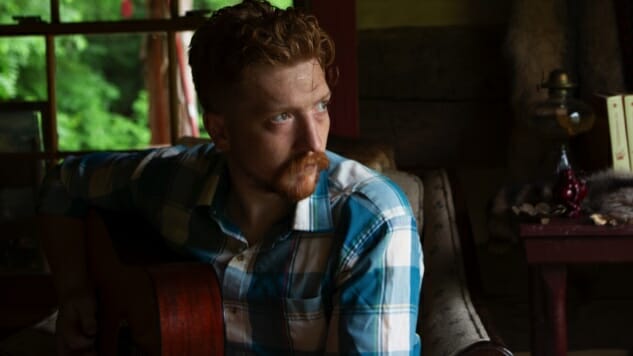The Curmudgeon: Musical Voices from Rural Kentucky
Tyler Childers photos by David McClister
Ever since Donald Trump won his surprising 2016 victory (in the Electoral College if not the popular vote), blue-state journalists have been trying to explain the mysterious mindset of red-state voters. For newspapers and magazines, these writers have interviewed waitresses, coal miners, nurses, steel workers and farmers to understand why they voted as they did.
These exercises are often unsatisfying, for the interviewees are rarely analytical or articulate enough to shed much light on the question. Perhaps it would be more helpful to hear from the region’s best songwriters. After all, they’re speaking to and for those voters, drawing from a common set of experiences and talking in a common language.
This year two singer/songwriters from rural Kentucky, Mitch McConnell’s base of support and one of the reddest regions in the nation, have released records that get inside the skin of Kentucky’s working class better than any expense-account journalism ever could. Tyler Childers’ Country Squire and Chris Knight’s Almost Daylight draw portraits of their neighbors that are likely to defy the expectations on both the left and right. The characters in these stories harbor desires too earthy and frustrations too maddening to fit anyone’s theory.
On “Bus Route,” for example, Childers recalls riding the school bus as a kid in Lawrence County, on the border with West Virginia. Over a bouncy, hillbilly two-step, his narrator describes the terrors of the bus driver’s hand-carved pine paddle and the attractions of “the prettiest little girl, same grade as me.” When they turned 16, he and the girl lost their virginity in her bedroom while her parents were gone. It’s good they were gone, because her daddy would have “killed me in a minute” and fed the corpse to the hogs, who’ll “eat anything you give ’em.”
What’s fascinating about the song is how Childers doesn’t pass moral judgment on any of these characters. The driver was right to paddle his wild-ass passengers; the teenagers were right to act out their lust, and the father would have been right to feed the boy to the pigs. Rural America, in this view, is not a monolithic place, where everyone agrees on everything. It’s a complicated place, where conflicting desires get sorted out through subterfuge and violence.
The album’s title track describes the dream of owning a Country Squire, a high-end mobile home, an ambition so cut down that it’s heartbreaking. On the cry-in-your-beer ballad, “Peace of Mind,” Childers’ narrator explains how elusive that title can be. In our fantasies, country living is synonymous with peace of mind. But the reality is different if you can’t smoke pot because you want to keep your railroad job, if the vodka can’t drown out the wife’s long phone calls with her high school boyfriend, and if you’d like to feed your daughter’s boyfriend to the hogs, but you just can’t find the time.
Sometimes the conflicts aren’t between people but inside one person. On the trad-country “Gemini,” Childers admits that half of him wants to settle down with the woman he’s singing to, but the other half can’t “kick the urge to roam.” The album ends with the minor-key ballad “Matthew,” the portrait of a man who could “play like Clarence White,” the Byrds’ legendary guitarist, “if Clarence had a real job.” Matthew has such a job as night watchman at a missile silo, glad to have raised his “youngins right,” all the while wondering, What if?
Country Squire marks a major leap forward over Childers’ 2017 breakthrough second album, Purgatory. The earlier project relied too much on frank talk about different ways of getting high as a way to avoid the paradoxes of rural life. This new recording, by contrast, confronts those contradictions head on, yielding songs of greater drama and deeper psychology.
The songs have certainly struck a chord with rural listeners. Country Squire topped Billboard’s Top Country Albums chart, an achievement that neither Vince Gill nor Billy Ray Cyrus matched this year. Like its predecessor, the new album was produced by fellow Kentuckian Sturgill Simpson, who adds a few psychedelic touches but mostly puts Childers’ live arrangements into vivid focus with the help of some Nashville session musicians.
Simpson himself has abandoned rural instruments and rural themes on his own new album, Sound & Fury, a 1970s arena-rock retread much like the Raconteurs’ Help Us Stranger, only with fewer hooks and sillier lyrics. Simpson is a better singer than Childers, but not nearly as interesting a songwriter, and now that Simpson has abandoned his ambitious remake of country music to become a retro-psych-rocker, he matters less and less.
When Childers previewed three of the new album’s songs at Delfest on May 25, the crowd in trucker caps, overalls and cutoffs yelled back in affirmation that they knew exactly what he was talking about. The festival, hosted by Del McCoury and located on the Potomac River between West Virginia and western Maryland, drew an Appalachian audience for Appalachian music, and Childers was in his element.
-

-

-

-

-

-

-

-

-

-

-

-

-

-

-

-

-

-

-

-

-

-

-

-

-

-

-

-

-

-

-

-

-

-

-

-

-

-

-

-









































